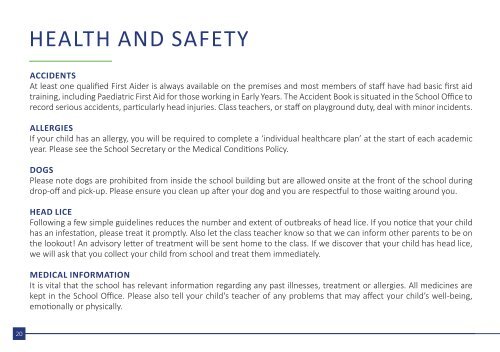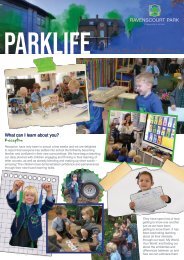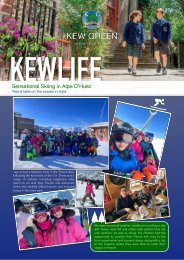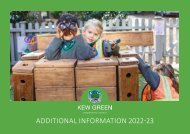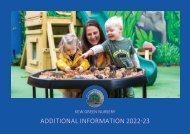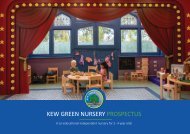KGPS Lower School Handbook 2023
- No tags were found...
You also want an ePaper? Increase the reach of your titles
YUMPU automatically turns print PDFs into web optimized ePapers that Google loves.
HEALTH AND SAFETY<br />
ACCIDENTS<br />
At least one qualified First Aider is always available on the premises and most members of staff have had basic first aid<br />
training, including Paediatric First Aid for those working in Early Years. The Accident Book is situated in the <strong>School</strong> Office to<br />
record serious accidents, particularly head injuries. Class teachers, or staff on playground duty, deal with minor incidents.<br />
ALLERGIES<br />
If your child has an allergy, you will be required to complete a ‘individual healthcare plan’ at the start of each academic<br />
year. Please see the <strong>School</strong> Secretary or the Medical Conditions Policy.<br />
DOGS<br />
Please note dogs are prohibited from inside the school building but are allowed onsite at the front of the school during<br />
drop-off and pick-up. Please ensure you clean up after your dog and you are respectful to those waiting around you.<br />
HEAD LICE<br />
Following a few simple guidelines reduces the number and extent of outbreaks of head lice. If you notice that your child<br />
has an infestation, please treat it promptly. Also let the class teacher know so that we can inform other parents to be on<br />
the lookout! An advisory letter of treatment will be sent home to the class. If we discover that your child has head lice,<br />
we will ask that you collect your child from school and treat them immediately.<br />
MEDICAL INFORMATION<br />
It is vital that the school has relevant information regarding any past illnesses, treatment or allergies. All medicines are<br />
kept in the <strong>School</strong> Office. Please also tell your child's teacher of any problems that may affect your child’s well-being,<br />
emotionally or physically.<br />
MEDICATION<br />
If a child needs regular doses of medicine, please try to ensure that this<br />
takes place out of school hours. If it is necessary for your child to take<br />
medication during the school day, please talk to the <strong>School</strong> Office. The<br />
parent/carer must complete a medical form giving permission for the<br />
administering of the medicine which is kept in the school office. The<br />
medicine should be in its original container. All medicines should be clearly<br />
labelled with your child's name and a written instruction stipulating the<br />
dosage and times required.<br />
Parents are responsible for ensuring that the school has an adequate<br />
supply of their child’s medicine and that it is replaced before it reaches its<br />
expiry date. All medicines kept at school must be collected by parents at<br />
the end of term and new ones provided at the start of the next term. Any<br />
medicines that are not collected at the end of term will be taken to the<br />
pharmacy for safe disposal.<br />
SICKNESS<br />
If your child is vomiting, has diarrhoea, conjunctivitis, a temperature or<br />
any contagious disease, please do not bring him/her to school until at<br />
least 24 hours after symptoms have cleared. As you can appreciate, a<br />
contagious illness can rapidly spread in a school environment. On these<br />
occasions, the whole school will be informed according to the statutory<br />
requirements.<br />
If a child becomes ill during the day we will contact you, and request that<br />
s/he is collected. If an infectious disease is diagnosed, please inform the<br />
school immediately and keep your child at home until fully recovered.<br />
20<br />
21


